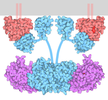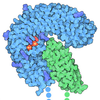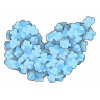[English] 日本語
 Yorodumi
Yorodumi- PDB-5kml: TrkA JM-kinase with 1-(5-methyl-3-phenyl-1,2-oxazol-4-yl)-3-[[2-(... -
+ Open data
Open data
- Basic information
Basic information
| Entry | Database: PDB / ID: 5kml | ||||||
|---|---|---|---|---|---|---|---|
| Title | TrkA JM-kinase with 1-(5-methyl-3-phenyl-1,2-oxazol-4-yl)-3-[[2-(trifluoromethyl)phenyl]methyl]urea | ||||||
 Components Components | High affinity nerve growth factor receptor | ||||||
 Keywords Keywords | TRANSFERASE/TRANSFERASE INHIBITOR / kinase / juxtamembrane / inhibitor / TRANSFERASE-TRANSFERASE INHIBITOR complex | ||||||
| Function / homology |  Function and homology information Function and homology informationneurotrophin p75 receptor binding / behavioral response to formalin induced pain / olfactory nerve development / TRKA activation by NGF / PLC-gamma1 signalling / Signalling to STAT3 / programmed cell death involved in cell development / response to hydrostatic pressure / neurotrophin receptor activity / mechanoreceptor differentiation ...neurotrophin p75 receptor binding / behavioral response to formalin induced pain / olfactory nerve development / TRKA activation by NGF / PLC-gamma1 signalling / Signalling to STAT3 / programmed cell death involved in cell development / response to hydrostatic pressure / neurotrophin receptor activity / mechanoreceptor differentiation / nerve growth factor receptor activity / neurotrophin binding / GPI-linked ephrin receptor activity / axonogenesis involved in innervation / nerve growth factor signaling pathway / Sertoli cell development / Retrograde neurotrophin signalling / nerve growth factor binding / sympathetic nervous system development / NGF-independant TRKA activation / Signalling to p38 via RIT and RIN / ARMS-mediated activation / positive regulation of Ras protein signal transduction / positive regulation of programmed cell death / positive regulation of synapse assembly / PI3K/AKT activation / peptidyl-tyrosine autophosphorylation / Frs2-mediated activation / neurotrophin TRK receptor signaling pathway / detection of temperature stimulus involved in sensory perception of pain / response to electrical stimulus / positive regulation of GTPase activity / Signalling to RAS / detection of mechanical stimulus involved in sensory perception of pain / neuron development / positive regulation of synaptic transmission, glutamatergic / response to axon injury / transmembrane receptor protein tyrosine kinase activity / axon guidance / cell surface receptor protein tyrosine kinase signaling pathway / peptidyl-tyrosine phosphorylation / B cell differentiation / response to nutrient levels / positive regulation of neuron projection development / receptor protein-tyrosine kinase / cellular response to nerve growth factor stimulus / circadian rhythm / : / cellular response to nicotine / kinase binding / recycling endosome membrane / neuron projection development / positive regulation of angiogenesis / late endosome membrane / late endosome / protein autophosphorylation / protein tyrosine kinase activity / neuron apoptotic process / early endosome membrane / spermatogenesis / negative regulation of neuron apoptotic process / learning or memory / early endosome / protein phosphorylation / positive regulation of ERK1 and ERK2 cascade / positive regulation of phosphatidylinositol 3-kinase/protein kinase B signal transduction / receptor complex / endosome membrane / response to xenobiotic stimulus / axon / negative regulation of cell population proliferation / neuronal cell body / dendrite / negative regulation of apoptotic process / cell surface / protein homodimerization activity / protein-containing complex / mitochondrion / ATP binding / identical protein binding / plasma membrane Similarity search - Function | ||||||
| Biological species |  Homo sapiens (human) Homo sapiens (human) | ||||||
| Method |  X-RAY DIFFRACTION / X-RAY DIFFRACTION /  SYNCHROTRON / SYNCHROTRON /  FOURIER SYNTHESIS / Resolution: 2.01 Å FOURIER SYNTHESIS / Resolution: 2.01 Å | ||||||
 Authors Authors | Su, H.P. | ||||||
 Citation Citation |  Journal: Proc. Natl. Acad. Sci. U.S.A. / Year: 2017 Journal: Proc. Natl. Acad. Sci. U.S.A. / Year: 2017Title: Structural characterization of nonactive site, TrkA-selective kinase inhibitors. Authors: Su, H.P. / Rickert, K. / Burlein, C. / Narayan, K. / Bukhtiyarova, M. / Hurzy, D.M. / Stump, C.A. / Zhang, X. / Reid, J. / Krasowska-Zoladek, A. / Tummala, S. / Shipman, J.M. / Kornienko, M. ...Authors: Su, H.P. / Rickert, K. / Burlein, C. / Narayan, K. / Bukhtiyarova, M. / Hurzy, D.M. / Stump, C.A. / Zhang, X. / Reid, J. / Krasowska-Zoladek, A. / Tummala, S. / Shipman, J.M. / Kornienko, M. / Lemaire, P.A. / Krosky, D. / Heller, A. / Achab, A. / Chamberlin, C. / Saradjian, P. / Sauvagnat, B. / Yang, X. / Ziebell, M.R. / Nickbarg, E. / Sanders, J.M. / Bilodeau, M.T. / Carroll, S.S. / Lumb, K.J. / Soisson, S.M. / Henze, D.A. / Cooke, A.J. | ||||||
| History |
|
- Structure visualization
Structure visualization
| Structure viewer | Molecule:  Molmil Molmil Jmol/JSmol Jmol/JSmol |
|---|
- Downloads & links
Downloads & links
- Download
Download
| PDBx/mmCIF format |  5kml.cif.gz 5kml.cif.gz | 77.4 KB | Display |  PDBx/mmCIF format PDBx/mmCIF format |
|---|---|---|---|---|
| PDB format |  pdb5kml.ent.gz pdb5kml.ent.gz | 54.6 KB | Display |  PDB format PDB format |
| PDBx/mmJSON format |  5kml.json.gz 5kml.json.gz | Tree view |  PDBx/mmJSON format PDBx/mmJSON format | |
| Others |  Other downloads Other downloads |
-Validation report
| Summary document |  5kml_validation.pdf.gz 5kml_validation.pdf.gz | 782.9 KB | Display |  wwPDB validaton report wwPDB validaton report |
|---|---|---|---|---|
| Full document |  5kml_full_validation.pdf.gz 5kml_full_validation.pdf.gz | 783.8 KB | Display | |
| Data in XML |  5kml_validation.xml.gz 5kml_validation.xml.gz | 13.1 KB | Display | |
| Data in CIF |  5kml_validation.cif.gz 5kml_validation.cif.gz | 17.8 KB | Display | |
| Arichive directory |  https://data.pdbj.org/pub/pdb/validation_reports/km/5kml https://data.pdbj.org/pub/pdb/validation_reports/km/5kml ftp://data.pdbj.org/pub/pdb/validation_reports/km/5kml ftp://data.pdbj.org/pub/pdb/validation_reports/km/5kml | HTTPS FTP |
-Related structure data
| Related structure data |  5kmiC  5kmjC  5kmkC  5kmmC  5kmnC  5kmoC C: citing same article ( |
|---|---|
| Similar structure data |
- Links
Links
- Assembly
Assembly
| Deposited unit | 
| ||||||||
|---|---|---|---|---|---|---|---|---|---|
| 1 |
| ||||||||
| Unit cell |
|
- Components
Components
| #1: Protein | Mass: 37292.785 Da / Num. of mol.: 1 Fragment: catalytic domain with juxtamembrane region, UNP residues 376-698 Source method: isolated from a genetically manipulated source Source: (gene. exp.)  Homo sapiens (human) / Gene: NTRK1, MTC, TRK, TRKA / Production host: Homo sapiens (human) / Gene: NTRK1, MTC, TRK, TRKA / Production host:  References: UniProt: P04629, receptor protein-tyrosine kinase |
|---|---|
| #2: Chemical | ChemComp-6UH / |
| #3: Water | ChemComp-HOH / |
| Has protein modification | Y |
-Experimental details
-Experiment
| Experiment | Method:  X-RAY DIFFRACTION / Number of used crystals: 1 X-RAY DIFFRACTION / Number of used crystals: 1 |
|---|
- Sample preparation
Sample preparation
| Crystal | Density Matthews: 2.41 Å3/Da / Density % sol: 49.02 % / Mosaicity: 0 ° |
|---|---|
| Crystal grow | Temperature: 298 K / Method: vapor diffusion, hanging drop / pH: 6.5 Details: 50mM MES pH 6.5, 150 mM NaCl, 5mM TCEP, 0.1% beta-OctylGlucoside |
-Data collection
| Diffraction | Mean temperature: 100 K | ||||||||||||||||||||||||||||||||||||||||||||||||||||||||||||||||||
|---|---|---|---|---|---|---|---|---|---|---|---|---|---|---|---|---|---|---|---|---|---|---|---|---|---|---|---|---|---|---|---|---|---|---|---|---|---|---|---|---|---|---|---|---|---|---|---|---|---|---|---|---|---|---|---|---|---|---|---|---|---|---|---|---|---|---|---|
| Diffraction source | Source:  SYNCHROTRON / Site: SYNCHROTRON / Site:  APS APS  / Beamline: 17-ID / Wavelength: 1 Å / Beamline: 17-ID / Wavelength: 1 Å | ||||||||||||||||||||||||||||||||||||||||||||||||||||||||||||||||||
| Detector | Type: DECTRIS PILATUS 6M / Detector: PIXEL / Date: Aug 22, 2012 | ||||||||||||||||||||||||||||||||||||||||||||||||||||||||||||||||||
| Radiation | Monochromator: Si(111) / Protocol: SINGLE WAVELENGTH / Monochromatic (M) / Laue (L): M / Scattering type: x-ray | ||||||||||||||||||||||||||||||||||||||||||||||||||||||||||||||||||
| Radiation wavelength | Wavelength: 1 Å / Relative weight: 1 | ||||||||||||||||||||||||||||||||||||||||||||||||||||||||||||||||||
| Reflection | Resolution: 2.01→22.89 Å / Num. obs: 24237 / % possible obs: 100 % / Redundancy: 9.8 % / Biso Wilson estimate: 35.62 Å2 / Rsym value: 0.057 / Net I/av σ(I): 10.375 / Net I/σ(I): 26.8 | ||||||||||||||||||||||||||||||||||||||||||||||||||||||||||||||||||
| Reflection shell |
|
- Processing
Processing
| Software |
| ||||||||||||||||||||||||||||||||||||||||||||||||||||||||||||||||||||||||||||||||||||||||||||||||||||||||||||
|---|---|---|---|---|---|---|---|---|---|---|---|---|---|---|---|---|---|---|---|---|---|---|---|---|---|---|---|---|---|---|---|---|---|---|---|---|---|---|---|---|---|---|---|---|---|---|---|---|---|---|---|---|---|---|---|---|---|---|---|---|---|---|---|---|---|---|---|---|---|---|---|---|---|---|---|---|---|---|---|---|---|---|---|---|---|---|---|---|---|---|---|---|---|---|---|---|---|---|---|---|---|---|---|---|---|---|---|---|---|
| Refinement | Method to determine structure:  FOURIER SYNTHESIS / Resolution: 2.01→22.89 Å / Cor.coef. Fo:Fc: 0.9428 / Cor.coef. Fo:Fc free: 0.9302 / SU R Cruickshank DPI: 0.167 / Cross valid method: THROUGHOUT / σ(F): 0 / SU R Blow DPI: 0.165 / SU Rfree Blow DPI: 0.146 / SU Rfree Cruickshank DPI: 0.148 FOURIER SYNTHESIS / Resolution: 2.01→22.89 Å / Cor.coef. Fo:Fc: 0.9428 / Cor.coef. Fo:Fc free: 0.9302 / SU R Cruickshank DPI: 0.167 / Cross valid method: THROUGHOUT / σ(F): 0 / SU R Blow DPI: 0.165 / SU Rfree Blow DPI: 0.146 / SU Rfree Cruickshank DPI: 0.148
| ||||||||||||||||||||||||||||||||||||||||||||||||||||||||||||||||||||||||||||||||||||||||||||||||||||||||||||
| Displacement parameters | Biso max: 120.29 Å2 / Biso mean: 40.18 Å2 / Biso min: 15.5 Å2
| ||||||||||||||||||||||||||||||||||||||||||||||||||||||||||||||||||||||||||||||||||||||||||||||||||||||||||||
| Refine analyze | Luzzati coordinate error obs: 0.276 Å | ||||||||||||||||||||||||||||||||||||||||||||||||||||||||||||||||||||||||||||||||||||||||||||||||||||||||||||
| Refinement step | Cycle: final / Resolution: 2.01→22.89 Å
| ||||||||||||||||||||||||||||||||||||||||||||||||||||||||||||||||||||||||||||||||||||||||||||||||||||||||||||
| Refine LS restraints |
| ||||||||||||||||||||||||||||||||||||||||||||||||||||||||||||||||||||||||||||||||||||||||||||||||||||||||||||
| LS refinement shell | Resolution: 2.01→2.1 Å / Total num. of bins used: 12
|
 Movie
Movie Controller
Controller




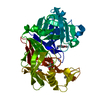

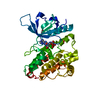
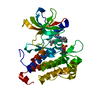
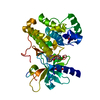

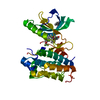
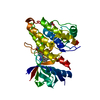
 PDBj
PDBj
